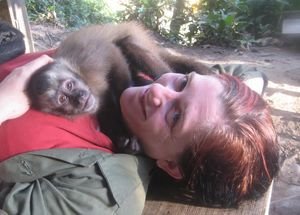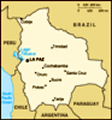Advertisement
Published: August 4th 2008

 Cappucino
Cappucino
Much of the day was spent playing with Luna, spider park's resident friendly capuchin. Sorry for the *huge* post, but there is much to say about the past 5 weeks volunteering and living with the monkeys at Parque Machia in the jungle in Bolivia.
There are three main types of monkeys at Inti Wara Yassi.
The first, the capuchins are hightly intelligent. One of the smarter capuchins, Boodie (the alpha male) has actually escaped three times from a locked cage in the clinic. It is thought in one of his escapes he bribed or convinced another capuchin to steal the keys and let him out (the capuchins are also highly adept at opening locks). Another of his escapes was even more impressive. He started to become very attached to the blanket in his cage and refused to let the volunteers take it for washing. Eventually they gave up as he became quite aggressive when they came close to his precious treasure. One morning the staff came to work to find only the favoured blanket in the place where boodie used to be. When they lifted it up they found the reason for his possessiveness - a tunnel he had been carefully digging over the previous days, using his blanket to hide the evidence!

 Valentina
Valentina
Valentina is Spider Park's most playful girl who loves nothing more than being turned upside down and being swung by her tail and legs in play. It is also rumoured that this same capuchin, who has a prior history as a trained thief, can actually differentiate between the different denominations of Bolivian money and will always choose the higher bill if two are placed in front of him! The phrase - ‘Monkey see, Monkey do’ could have be coined for the capuchins who are excellent mimics and learn fast. Of the few Capuchins who spend time in the Spider Park a few have taken to copying our routine of washing the tables by dunking the scrubbing brush in water and vigorously scrubbing the table down with it.
The capuchins intelligence is only matched by their fierce tempers and turn-on-a-dime moods which can turn very quickly from play or foraging to all out aggression. Blood spots often dot the path through monkey park where the capuchins are fed and play with the tourists. Usually they attack because you aren’t giving them something they want or because the tourists are getting too friendly - but sometimes it is just a matter of a grumpy mood. One of my fellow team members recently felt the brunt of a capuchin’s aggression when he, for seemingly no reason, bit hard

 Grooming time
Grooming time
The monkeys look after each other by checking for ticks and cleaning dirt off each other. Once you are accepted by them they turn their grooming attentions to you. This is Anita, the alpha female of the capuchin crew grooming me. into her hand resulting in stitches and much, much blood (as he happened to hit upon a vein).
The second type of Inti Wara monkey is the squirrel. They are gorgeous luminous yellow and white creatures with deep black ‘helmets’ and stand less then 20cm high. They look like they could have been brought to you direct from the animators hands at Pixar Studios or alike. Surely the natural world couldn’t create something so god-damn cute, fluffy and technicoloured? They are lightening fast and run in hordes with a tribe numbering up to a few hundred. They aren’t very social with humans, preferring to keep to themselves and skittering away if you come close to them. They will follow the food, however and are sneaky and impossibly quick when they decide your breakfast banana would be better off in their capable hands!
The third monkey group is the spiders - of which there are 28 in the park. They are a much more emotional, tranquil group who care for each other like family. They play and squabble like any other monkeys but they are just as likely to be found lounging around, soaking up the sun or grooming

 Trifecta
Trifecta
The three monkeys types in the park - Cappuchin, Squirrel and Spidereach other languidly on a bench. They are much less temperamental than the capuchins and would much prefer a cuddle than to steal your belongings. The males, however, have to be carefully managed as they can exhibit aggression to rival anything any other animal in the park can dish out - even the pumas, I have heard. As a result, our two strongest males are kept padlocked permanently to runners as they are too much of a risk to the safety of the volunteers and visitors to the park.
I have been living with this third group in Spider Park for the past 5 weeks - for a 12 hour working day each day with only 2 days off a month. In the natural world, spiders never come to the ground, preferring to live solely in the branches of towering jumgle trees, so it’s an amazingly special experience to have such close access to them. There are 22 free spiders and 7 others who, for various reasons - usually a risk of escape to the local town - are confined to ropes around their necks which we attach to a series of ropes to give them the run of

 Ramona
Ramona
One of the hazards of working in the park was avoiding the advances of some of the more randy females. The randiest of them all, Ramona is in mid-flight of her sex-dance here. It is usually followed by her rushing away into the bushes where she will watch you from afar.. and then.. when you least expect it.. she will be on your leg, madly humping your wellie. Thankfully, she is on a cord so this never got too intense as you just need to walk to the limits of the cord and she begrudgingly lets go. the main park. There is also a Capuchin monkey, Tau Tau who apparently didn’t fit in with his own crew now lives like (and thinks he is) a spider. He eats with the spiders and will often join in on a group response to a perceived threat in the park. In the latter weeks of my time at the park, however, he became extremely aggressive to our corded alpha male and beat him up quite badly and has since had his spider park feeding priveleges revoked. This has been particularly difficult for him as when he returned to monkey park to find food he was badly beaten up by the alpha male there and was finding it hard to find a place for himself.
My working day begins with releasing the animals from their nighttime cage. They travel by rope across a small gorge to reach the main spider park. Some come by themselves and some are hooked onto the rope by carabeeners attached to the ropes around their necks. Much of the work during the day involves switching them through a series of runners to allow them to move freely(ish) around the park.
Feeding takes up much

 The man who should be king
The man who should be king
This is Tau Tau, the honorary spider who was the only capuchin to have eating rights at Spider Park - until he got too big for his boots and attacked one of the spiders. of the rest of the time with 3 meals and other snacks being prepared and served each day. Other jobs during the day include a 1 hour jungle walk (with the corded monkeys on ropes attached to your belt), cage cleaning, and hand washing of the poopy, pissy, primates’ bedtime blankets.
The rest of the time is spent watching, cuddling and playing with the monkeys. They have complex and fascinating social dynamics to rival the best daytime soap operas have to offer - with a rich cast of characters and romance, intrigue and action in abundance.
From the past-his-time ex-alpha male who sits on his rope incontinently pissing himself on volunteers to the sex crazed girl about town (Ramona) and the spoilt good looking rich kid (son of the top female monkey) who is yet to encounter discipline - all the characters are there.
Of course, every good soapie needs a baddie and Spider Park offers two iron clad nasties. Dubbed ‘the machos’ they are two previously released spiders who have found themselves lacking in female company and have come back, bigger and badder than ever after a year on their own in the jungle, to get

 Monkey taxi
Monkey taxi
The walk to spider park often involved picking up hitchhikers.. the girls they need to build their own pack.
When one of them was in the park he alone was responsible for the death of three park spider monkeys - and that was when he was domesticated(ish)! The machos are a big risk to the continuity and safety of the group and will badly injure any monkey left alone. As a result, at least one of us is always on ‘macho watch’. If the machos get too close to base camp we scream and act big to intimidate them back into the jungle to save more damage to the male monkeys in our group.
Unfortunately, despite the best efforts of volunteers the machos have already claimed a few casualties - one of which has upset the entire social dynamics of the group. About two months ago Tao, the group’s alpha male - who is charged with maintaining stability of the group, was attacked by a macho and, as a result, is now kept in a cage in a different area of the park for his own safety. This is a desperate situation not only for the proud beast of the jungle stuck in confinement but also because there

 Wendy
Wendy
Wendy loved nothing more than draping herself around your neck and enjoying the ride through your daily dutiesis no longer a voice of wisdom and power in the park - and the not yet mature males have been left with the responsbility of guardianship when they are not ready.
Throughout my time in the park, the machos grew steadily bolder and came increasingly closer. This was cemeted when one of the females of our group had a baby and on the first day took it up to the machos. It is widely believed that one of them is the father and it is likely this will impact on how things will develop in the future. It is possible that Kishu, the mother will leave Spider Park to join the Machos. It is also possible that she will try to bring the macho father back into the group. A much worse outcome could be a macho storming of the park if and when they realise that the volunteers threats are little more than bluster and their desire to take on the alpha male role in the park grows. Time will tell.
Which leaves the functional alpha male status free. For the moment it is being filled by Octavio - a young stud with brawn and looks

 Squirrel
Squirrel
The cutest of the monkeys guarding the way to the out-of-bounds area for touristsbut not too much experience. He has a history of not liking newcomers and the week before I came he attacked another volunteer as she was walking through spider park to get to another monkey area - the Monkey Mirador which is further up the mountain. She ended up with stitches in her back and a healthy dislike of Octavio.
When I first met him he jumped on my head and started biting me (not too hard) but was quickly retrieved by another volunteer. On the second occasion he loomed aggressively over me making threatening noises and baring his teeth like he was about to attack. Thankfully, this didn’t happen and within three days I was accepted by him and he now comes to me and sits on my head when the machos are getting too close.
Working with the monkeys relies a lot on an understanding of the ways they communicate. While the normal response for me to show friendship is to look someone in the eye and smile this is actually a display of agression for the spiders. Teeth are the most threatening part of the body you can display and if you couple that with

 Feeding time
Feeding time
The female capuchins love to share their food (by shoving it in your mouth with their grit covered fingers :()eye contact you are brewing a recipe for trouble. After a few weeks in the park, however, I became quite comfortable with the spider language and could greet and talk to the spiders more appropriately which made the relationships much stronger quite quickly.
While the park is mainly composed of females this isn’t such a problem as they are not naturally aggressive you have to be wary of sending the wrong messages to the boys. The best way to greet them is with a lips pouted in a kissing type expressions and quick high-pitched squeaking noises which are a greeting and a sign of happiness.
The spiders are very different form the capuchins. The capuchins are very technically savvy and show incredible intelligence. The spiders, in contrast, are not equipped with either the sneakiness or the opposable thumb that the capuchins have. But they have something the single mindedness of the capuchins will never allow - a sense of empathy and love for their fellow spiders. Where the capuchins are functioning on an ‘each man for himself’ ethos the spiders look after each other and will often rescue each other from difficult situations.
Each day offered new

 I don't think you'd see this in the wild
I don't think you'd see this in the wild
A squirrel cosying up to Nanita, the spiderbreakthroughs - mainly in relationship building with individual monkeys. Some warm to you immediately - particularly those who spend a lot of their time in monkey park with the tourists - and some take time to build trust. Virtually every day I was in the park there was another relationship forged or an existing one that deepened. Usually this was the first time a monkey came and sat on my lap for a cuddle but sometimes the evolving relationship was shown through being groomed by a monkey that had previously ignored me or a monkey coming to me and sitting on my head for protection when they felt stressed.
It has been incredibly hard and incredibly rewarding work. Aside from the long hours, the occassional bites and the sometimes difficult interpersonal dynamics of the volunteers it has also been an emotional see saw with dramatic events occuring almost daily. In my time there one of our tribe died (electrocution) and another was born the day after. Only 2 spiders have died from the group in the last few years and only 2 have been born so both were very very big events for the whole park.
On the

 Nikita
Nikita
Thoughtful monkeywhole, though, it has definetely been one of the most incredible experiences of my life and I would highly recommend it to anyone who has the resilience for the hours and discomfort as these are far outweighed by the bonds you build and the belief that you are doing something good for the animals.
Advertisement
Tot: 0.076s; Tpl: 0.013s; cc: 9; qc: 49; dbt: 0.0439s; 1; m:domysql w:travelblog (10.17.0.13); sld: 1;
; mem: 1.1mb









